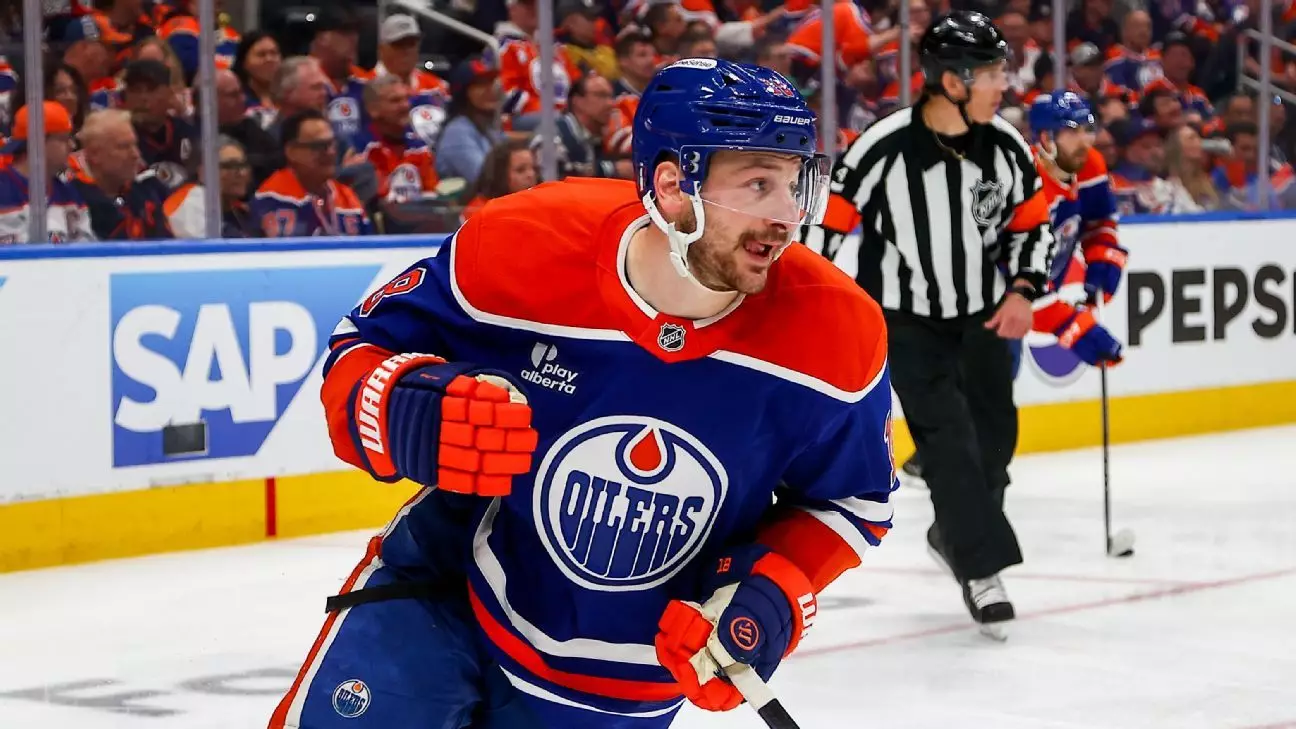In a gripping tale from the ice rink, Edmonton Oilers’ star center Leon Draisaitl’s emotional FaceTime with teammate Zach Hyman touched hearts and captured the essence of camaraderie in sports. After the Oilers clinched the Western Conference championship against Dallas, Draisaitl reached out to Hyman, who had recently suffered a season-ending wrist injury. Hyman’s response was raw and genuine—he cried, overwhelmed by the whirlwind of emotions and the weight of his situation. It’s moments like these that illustrate the fabric of a team; beyond the tactics and statistics, it’s the emotional bonds that often drive a group towards greatness.
Hyman’s journey this season has been anything but ordinary. He was injured during a crucial Game 4, succumbing to an unfortunate collision with Dallas’ Mason Marchment. The diagnosis—a dislocated wrist—prompted immediate surgery and dashed any hopes Hyman had of playing again this season. The moment of realization was filled with anguish for him. Hyman recounted feeling the immediate devastation but also a burning desire to fight through it, a sentiment familiar to many athletes who grapple with their physical limitations. This is where sports psychology meets physicality—the understanding that sometimes, perseverance must yield to the needs of the body.
The Emotional Backbone of a Team
Zach Hyman is not just a player; he is a cornerstone of emotional leadership for the Oilers. Oilers coach Kris Knoblauch articulated this clearly when he emphasized how essential Hyman is to the team’s morale and emotional health. Emotional intelligence in sports can often tip the scales; players who serve as emotional anchors have the power to uplift teammates during rocky times. Hyman’s influence was palpably felt when Oilers captain Connor McDavid—fully aware of his friend’s plight—comforted him. This solidarity reveals an important dynamic; sports are about more than individual victories—they’re about shared struggles and collective resilience.
As the Oilers prepared for their Stanley Cup Final rematch against the Florida Panthers, the absence of Hyman was palpable. His on-ice contributions were significant; with five goals and six assists so far in the playoffs, his role as a physical presence, contributing heavily to the team’s scrappiness, was irreplaceable. The playoffs can be brutal, and Hyman led the league with 111 hits, embodying the grit needed in high-stakes matchups. His absence against a physically bruising team like the Panthers brings a noticeable tactical deficiency. The Oilers had to look elsewhere, with Corey Perry stepping onto the top line in a bid to fill the void left by Hyman’s injury.
Fostering a Culture of Resilience
Yet, this isn’t just about adapting to loss; it’s about channeling that loss into motivation. Hyman had become a beacon of hope and rallying cries within the locker room. After a bitter Game 7 defeat to the Panthers in the previous season’s Stanley Cup Final, his words of assurance—“I know we’re going to be back”—transformed the team’s mindset. This kind of leadership isn’t easily quantifiable in stats, but it often translates into performance on the ice. Hyman’s belief in the team instilled a fire that fueled Edmonton’s hunger to return to the finals and seek redemption.
As the series against the Panthers unfolds, the Oilers find themselves not just striving for a championship but also embodying a larger message: the spirit of unity during adversity. Adam Henrique’s sentiments played into this narrative powerfully. With collective determination, the team is fighting not only for victory but also to honor Hyman’s journey and contributions. These unyielding bonds—both emotional and tactical—are the glue that holds the Oilers together, a stark reminder of what it truly means to be a team.
In witnessing Hyman’s journey and the Oilers’ response to his absence, fans are treated to a narrative replete with emotion, struggle, and the indomitable spirit that characterizes professional sports. Such stories transcend stats and scores; they connect us to the heart of competition and the resilience of the human spirit, making each game more than just a battle on ice. It’s a testament to the potential of sports to foster deep relationships and unwavering support that often echo outside the arena.


Leave a Reply